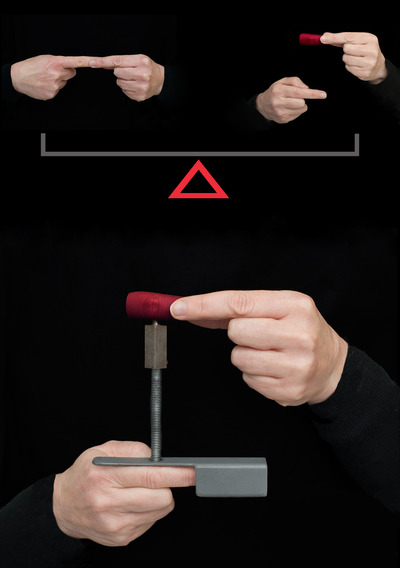How the brain makes body maps
Our current understanding of how we sense our physical position in space (proprioception), and which parts of our body belong to us, has been expanded by the finding that muscle receptors alone can provide this information.
Previously it was not known whether signals from muscle receptors alone could influence perceived ownership of a body part, whereas touch and vision are more obviously involved in this.
Professor Simon Gandevia, Deputy Director of Sydney-based Neuroscience Research Australia, and colleagues tricked the brain into believing it owns a fake finger by using only sensory inputs from the muscles.

“It may seem silly to ask yourself whether your index finger is part of your body. However, our current findings demonstrate that this question is far from silly and has led to important insights into key brain functions,” Gandevia said.
The researchers induced a sense of ownership of an artificial finger using movement of the index finger without allowing the subject to see their hands. Receptors in the skin had been anaesthetised, so the illusion depended on proprioceptive signals from muscle receptors.
Proprioception refers to our ability to sense movement within our joints and joint position. This ability allows us to know where our limbs are in space without having to look.
“The experiment relies on removing skin and joint messages from the relevant fingers both on the test side (the right) and the left, which we call the grasping side. This side grasps a fake finger,” explained Gandevia.
“When your grasping left fingers are made to move the fake right finger that is connected to your real right finger congruently, you will believe that you are holding your right index finger with your left hand. The fake finger becomes your own right index finger.”
The findings provide fundamental information into how the brain makes maps of the body so that it can then make accurate movements.
Gandevia predicts the findings will provide new insight into clinical conditions where proprioception is disrupted, such as stroke, schizophrenia and phantom limb syndrome.
The research has been published in the Journal of Physiology.
The University of Sydney formalises cervical cancer elimination partnership
The success of a cervical cancer elimination program has led to the signing of a memorandum of...
Noxopharm says paper reveals science behind its immune system platform
Clinical-stage Australian biotech company Noxopharm Limited says a Nature Immunology...
Neurosensing/neurostimulation implants session to be held on Monday
On Monday, a session at UNSW Sydney will include people who are benefiting from bioelectronics...



